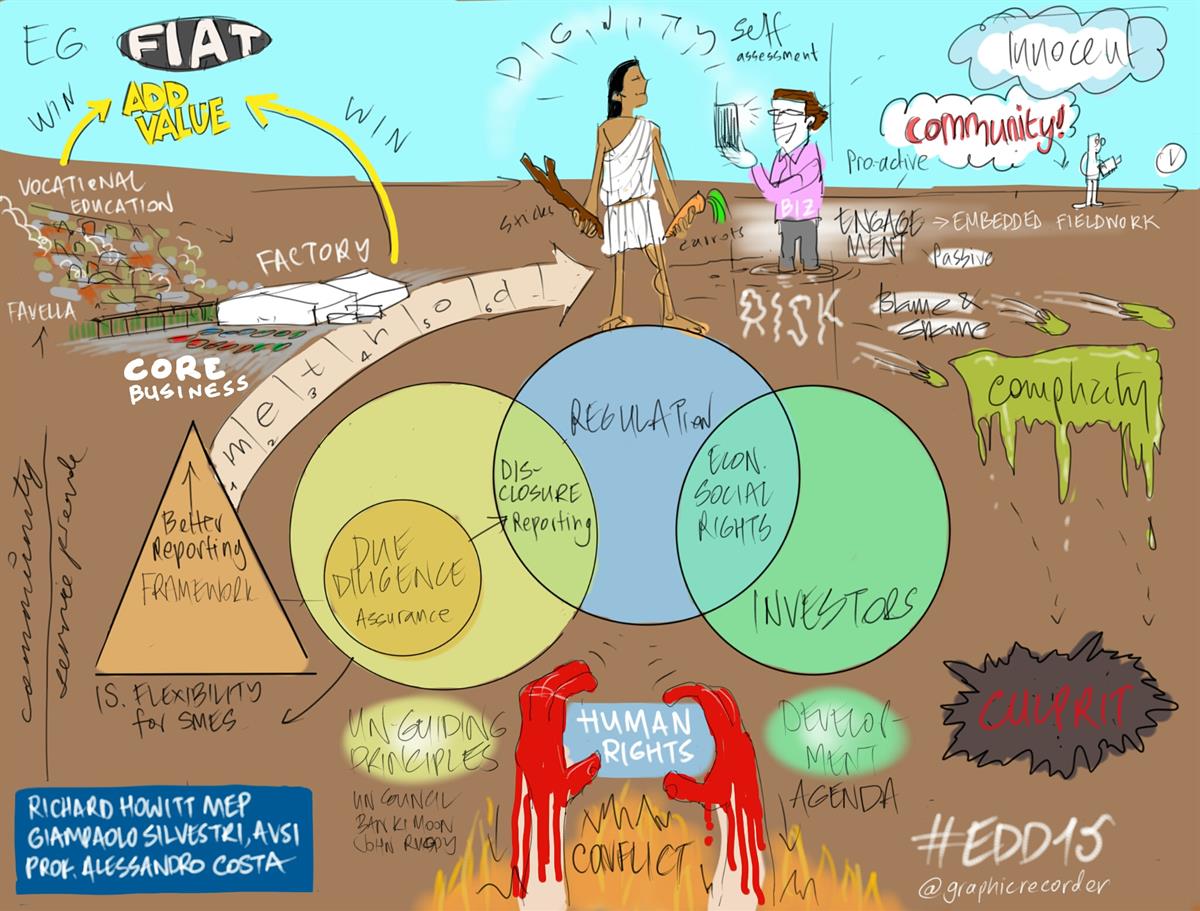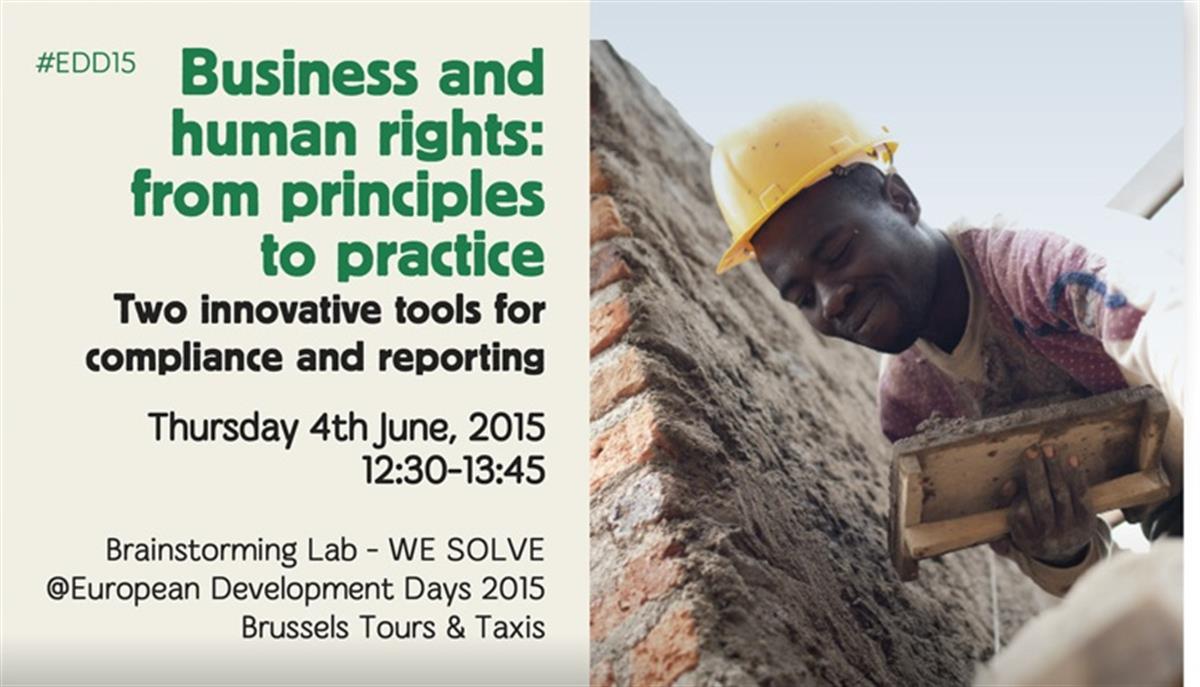
AVSI Foundation and Mazars, international professional services firm, organized a lab at European Development Days 2015 in Brussels, Europe's leading forum on development and international cooperation. The lab was the presentation of the first uniquely practical tools to help companies meet the regulatory imperative for more and better human rights reporting.

This brainstorming lab aimed to contribute to the ongoing dialogue on sustainability and bridge the gap between the corporate sector and the ongoing challenges within the developing world, encourage mature dialogue between civil society, NGOs and businesses."It is important to talk about the link between human rights and development, which are not the same thing - Richard Howitt, European Parliament Rapporteur on Corporate Social Responsibility, said to introduce the panel - Human rights is about stopping conflict and respecting human beings, not only material well-being but also being free of fear. Businesses must perform due diligences, a mechanism to assure HumanRights are respected"
"Human rights are based on dignity; by respecting their dignity, people can be part of society", , secretery general of AVSI Giampaolo Silvestri said, as first panelist to speak. He then spoke about AVSI's project Arvore da Vida, an example of innovative CSR which was able to help "more than 10.000 youth of the huge favela of Betim, in Brasil".
"The most important thing to highlight - Giampaolo Silvestri continued - is that we need to stimulate the engagement of both companies and local communities, because protecting human rights must be a win-win situation for businesses or else it's not going to work. This is the framework in which NGOs should work: the role of an NGO as compared to businesses is to be on the ground, maintain the link with the community"
"Small businesses are very complying, because they are close to people they work with. It is far more complex for bigger organizations. That's a reason why there is a margin of flexibility in the compliance process, referring to the size of enterprises", - prof. Alessandro Costa said, talking about the document on SMEs and human rights compliance he wrote. A practical tool to support the process of awareness raising for SMEs, made of 4 steps: awareness, self-assessment, risk identification, engagement.
Then it was the turn of Caroline Rees from SHIFT, talking on Skype and highlighting how "83% of companies think that human rights are relevant for their business model. Although, the human rights reporting is still often the poor cousin of other reporting metrics".
"Respecting human rights is a long term objective. It is a journey - Head of Global Business And Human Rights practice of Mazars, Richard Karmel, said - Business creates wealth, stimulate innovation and improve public service through a more effective taxation. But reporting is needed".
"Human rights reporting should not be a parallel way of thinking - it should be embedded in the business strategy", legal adviser Giulia Di Tommaso said - Grievance mechanisms and remedies are key inside companie".
Read the document "Business and Human Rights"
Go to Mazars website
BACKGROUND
AVSI and Mazars both have led initiatives to advance the respect of human rights within business in the profound belief that the profit and not-for-profit sectors can collaborate successfully for sustainable development.
In today's ever more transparent world, companies are under increasing pressure to show that they respect human rights throughout their operations and value chains. This means demonstrating that they are not harming the fundamental dignity and welfare of people as they go about their legitimate work and generate the jobs, wealth and growth that benefit all societies.
Since 2011 when the UN unanimously endorsed the Guiding Principles on Business and Human Rights, companies have an authoritative global standard that sets out their responsibilities. Governments, stock exchanges and investors are increasingly requiring companies to report on their performance on human rights related issues, from the European Union, to the US , to India, to Brazil.
Companies have also promoted self–regulatory processes to address the different interests of their stakeholders. But skepticism on the efficacy of self regulation persists. Meanwhile a growing number of NGOs and CSOs reaffirm the incompatibility of interest and culture between the business community and sustainable growth.
During this session at EDD 2015, Mazars and AVSI will present the innovative tools and processes that they have developed independently to enable companies to begin reporting on their human rights performance, regardless of size or how far they have progressed in implementing their responsibility to respect human rights.
By helping companies both improve their transparency and accountability for human rights issues, and analyze and enhance their management of human rights impacts, the proposed tools have the potential to positively impact on millions of peoples' lives.
The UN Guiding Principles Reporting Framework, developed by MAZARS and SHIFT, is the first comprehensive guidance for companies to report on human rights issues in line with the United Nations Guiding Principles on Business and Human Rights. The Framework is available for free for everybody at UNGPreporting.org
The paper “Business and Human Rights: a challenge for enterprises”, resulting for a collaboration of AVSI with the University of Rome Tor Vergata, analyses over 300 case studies and proposes a due diligence method with a focus on SMEs.
This brainstorming lab aims to:
- contribute to the ongoing dialogue on sustainability and bridge the gap between the corporate sector and the ongoing challenges within the developing world;
- encourage mature dialogue between civil society, NGOs and businesses, reflecting that they typically have more to gain from collaboration than from confrontation;
- enhance knowledge of new tools and processes that companies can use to improve their behaviour, transparency and accountability.
Our objective is to set out how companies must look to understand their responsibilities to respect human rights, and how they articulate their resulting expectations to their workforce, subsidiaries, business partners and other entities directly linked to their operations, products or services.
We aim to improve the quality of non-financial reporting of companies in the area of human rights. This should result in embedding this key issue into their culture and risk management processes.
Ultimately, our desire is to reduce the number of corporate abuses of human rights and to act as a catalyst for change in the way companies behave and their global respect for human rights.